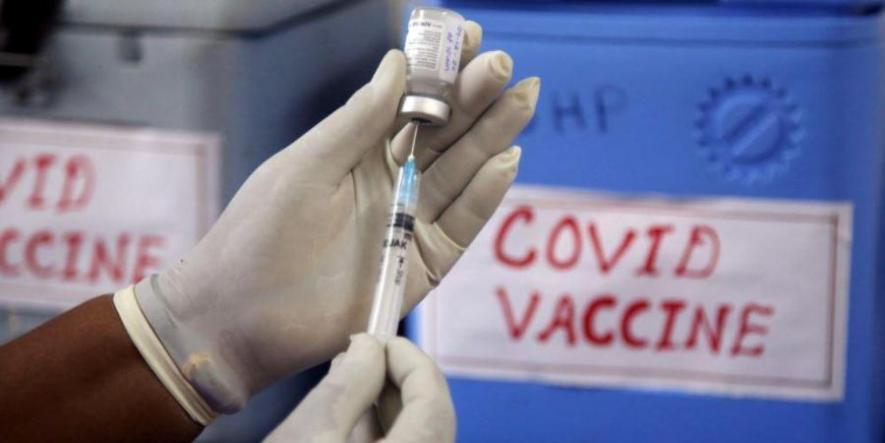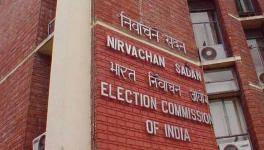Centre’s Vaccine Policy is Anti-Democratic and Unconstitutional

Image Courtesy: PTI
The Centre has either sanctioned or facilitated or backed the Serum Institute of India to make huge profits by selling the Covishield vaccine to the states in India at an exorbitant rate of Rs 300 and Bharat Biotech to sell Covaxin at Rs 400. Notably, SII agreed to sell 50% of its vaccine production to Centre at Rs 150, which must have included its profit margin.
Why did the Centre allow private companies to discriminate against states? It is a Constitutional atrocity, financial inequality and against the welfare of entire India, because the nation is composed of states and the Union does not have exclusive territory except a few UTs.
Why the people’s money from state should be used to pay double the price of vaccine to a private company? This policy of the Centre is in absolute violation of Article 21 (Right to Life) that includes right to health, as access has been unduly made unaffordable. It also violates Article 14 because the Centre takes 50% of the produce at half the price than at which it is sold to states.
The Business Policy on COVID-19 Vaccine
The central government has recently announced a policy called, “Liberalised Pricing and Accelerated National COVID-19 Vaccination Strategy”, which says in para 7: “In its phase-III, the National Vaccine Strategy aims at liberalised vaccine pricing and scaling up of vaccine coverage. This would, on the one hand, incentivise vaccine manufacturers to rapidly scale up their production and on the other hand, it would also attract new vaccine manufacturers.”
The failure of the policy is evident from the fact that after taking all incentives and profit-generating rating freedom to fix different prices for Covishield vaccine, Adar Poonawalla left the country to manufacture vaccine in other countries.
Also read: People are More Important than Patents and Profiteering
The policy that came to effect May 1, 2021, in para 7, further says, “It would make pricing, procurement and administration of vaccines more flexible and ensure augmented vaccine production as well as wider availability of vaccines in the country.” Vaccine manufacturers would supply 50% of their monthly Central Drugs Laboratory (CDL) released doses to Government of India and would be free to supply remaining 50% doses to state governments and in the other than GoI channel.
Liberal pricing resulted in different rates
The GoI in its submission to the Supreme Court argued that prices should be set by "market forces." The currently set prices of Rs 300 per dose for Covishield of (SII) and Rs 400 per dose for Covaxin of BB for state governments; Rs 600 and Rs 1,200 per dose respectively for private entities are far more than what is being paid abroad in developed countries. The SII vaccine is available in the European market at (USD 2.15) Rs 160 per dose, at (USD 2.10) Rs 210 per dose for GAVI (Vaccine Alliance), at (USD 3) Rs 222 in the UK and at (USD 4) Rs 297 in the US.
The question is, prices openly announced by the SII show that they are going to make 200% to 800% higher than the price paid by the central government. How can a welfare state like India permit a private company to make profiteering on suffering and disease of the people during the pandemic crisis? Why this permission to exploit the people? What is the benefit or profit the rulers get out of it?
Advocate Anand Grover in an article in Bar and Bench explained how this differential rating is unconstitutional, saying, “The prices for the states at Rs 300 for Covishield and 400 for Covaxin have not been set by the companies alone and have received the Centre's backing. There is no justification for differential pricing for the same vaccine between the Centre and the states. The more serious consequence is that if the states have to pay double the Central government's price, precious resources of the states would unnecessarily be diverted from other health and social welfare programs. This is in violation of fundamental rights under Articles 14 and 21 of the Constitution.”
Article 39 says that the government shall, in particular, direct its policy towards securing– (c) that the operation of the economic system does not result in the concentration of wealth and means of production to the common detriment. But the Centre is doing exactly opposite of it.
Article 47 says, The State shall regard the raising of the level of nutrition and the standard of living of its people and the improvement of public health as among its primary duties.
Entry 29 of the List III of the Seventh Schedule obliges the central government to assist the states "to control interstate spread of infectious diseases". Article 21 of our Constitution imposes an obligation on Centre to make essential health care goods, services and facilities "available and accessible" to all, and Article 14 says ‘without discrimination’. Public health policy and international obligations also mandate this. However, the central government’s current vaccine policy reflects a complete abdication of this obligation.
Also read: A Caring World Needs to Share Knowledge to End the Covid-19 Pandemic
Para 8 (v) of policy says, “COVID-19 vaccination will continue to be free for eligible population groups in all those Government Covid Vaccination Centres which receive vaccine doses from Government of India.”
This also does not explain where they will distribute the 50% doses they purchased from vaccine makers and what will happen to other 50%? A lopsided policy.
Para 8 (vii) says: The division of vaccine supply 50% to Govt. of India & 50% to other than Govt. of India channel would be applicable uniformly across for all vaccines manufactured in the country.
What is the meaning of “uniformly across” when there are different prices for different categories?
What does it do with 50% stocks produced by these two vaccine makers? How do they distribute and where? Will it confine only to Union Territories? If they distribute them to states, how do they do? Next para gives enormous powers to Union.
Para 8 (ix) says, “Govt. of India, from its share, will allocate vaccines to States/UTs based on the criteria of performance (speed of administration, average consumption), extent of infections (number of active Covid cases)”. This is another discriminatory procedure not based on any legally acceptable formula, leaving entirely to arbitrary discretion of some ministers or some babus loyal to ministers. This is yet another violation of Article 14.
Firstly Para 8(vii) imposes an obligation to make it uniformly accessible. This is followed immediately by para (ix) which contradicts and makes it impossible to provide uniform access. This policy is also against what has been practiced for the last 70 years as part of the universal immunisation programme (UIP), the Indian vaccine procurement system has centrally funded and procured all vaccines from manufacturers (public and private) and distributed them through the states to all persons free of charge.
Anand Grover rightly pointed out that “the procurement of all vaccines by the central government has the considerable advantage of a pooled bulk procurer using its negotiating power to lower prices from vaccine suppliers. Yet, for no apparent reason, the Central government abandoned the policy of procuring vaccines centrally. The advantage has thereby been frittered away by the Centre, compelling the state governments to negotiate for stocks with vaccine suppliers individually and compete with each other and the private sector.”
Former Health Secretary Sujatha K Rao opined that the policy of Prime Minister Narendra Modi’s government to allow COVID-19 manufacturers to fix prices without negotiation is “completely ridiculous”, vaccines “are not a luxury” and must be made freely and widely available.
Also read: Why the Pricing of COVID Vaccines is a Scam
“If the Centre’s Budget set aside Rs 35,000 crore for COVID-19 vaccination, why should states now fund vaccination? That was a question “everyone is asking, including me”. If there was no negotiation with manufacturers and the baseline price for the vaccine is Rs 400 or more per dose, then India will need about Rs 60,000 crore,” she told Article 14 in a recent interview.
“It's probably one of the most unfortunate policy designs that I have ever come across in my career,” said Sujatha Rao, who is Member of Governing Body of National Health System Resource Centre, a technical support institute of the National Health Mission and author of Do we care? India’s Health System.
The government at the Centre since the last seven years is just centralising everything, but it chose this important function to be thrown into the court of states, creating utter chaos and confusion. Grover says, “From the buyer's market, which the central procurement results in, the Central government has made it into a sellers' market. The sellers - Serum Institute of India (SII) and Bharat Biotech (BB) - will move from reasonable profits to profiteering.”
SII to produce vaccine in other countries
Adar Poonawalla of SII, which has capacity of production of 100 crore vaccine doses for year, has left India and is allegedly planning to produce it in other countries. Reportedly, he complained that he was threatened to the extent that his head would be chopped off if vaccine doses are not produced and supplied to them. He talked about unprecedented aggression and serious implications. He said, “I’m staying here for an extended period because I don’t want to go back to that situation.” Then how can SII increase its production and assure states about supplies?
Who funded the invention of vaccine?
The Indian Council for Medical Research (ICMR) developed the know-how for Covaxin which it shared with Bharath Biotech (BB). Grover comments, “BB claims to have spent Rs. 300 crore on clinical trials. The vaccine itself has been developed collectively in collaboration with the Indian Council of Medical Research (ICMR) and the National Institute of Virology (NIV). The clinical trials funded by BB and facilitated at government institutes allowed the speeding up of the process. BB is now receiving Rs 1,500 crore as advance to deliver 90 million vaccine doses by July. The central government has taken this extraordinary decision to provide funds for scaling up. Yet BB is charging Rs. 400 from the state governments.”
A recent study in the UK concludes that "public funding accounted for 97.1-99.0% of the funding towards the R&D of the ChAdOx technology developed by Oxford University and its application for SARS-CoV-2." Less than 2% of the funding came from private industry. Even the Oxford University is a publicly funded institution. The SII is manufacturing vaccine with the help of Oxford.
Grover explained, “SII got the technology and the know-how under an agreement with Astra Zeneca, which had licensed the vaccine from the University of Oxford with the aim that SII would produce one billion doses of vaccines for low-income countries at cost. It also received a grant from GAVI of USD 300 million (Rs 22,000 crore) to expand its manufacturing unit in India to cater for expansion and international needs. It has just received an unprecedented advance purchase agreement of Rs 3000 crore to facilitate scale-up.”
SII has received considerable support to produce the vaccine at cost. Adar Poonawalla had even admitted in an interview to NDTV that at Rs. 150 per dose, SII makes a profit. Yet, the Central government agreed to much higher prices on behalf of the states and allowed excessive pricing in the private sector. When the research is either funded by or belonged to people, how can the Centre allow private companies to take benefits at the cost of dying people?
(The author is a former Central Information Commissioner and professor of law at Bennett University. The views are personal.)
Get the latest reports & analysis with people's perspective on Protests, movements & deep analytical videos, discussions of the current affairs in your Telegram app. Subscribe to NewsClick's Telegram channel & get Real-Time updates on stories, as they get published on our website.
























